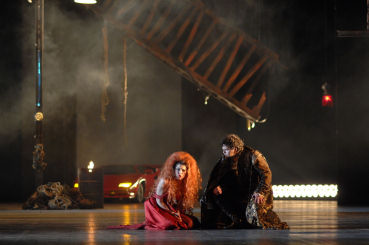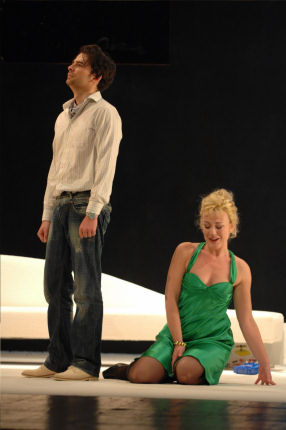|
Editorial Board
Melanie Eskenazi Webmaster:
Bill
Kenny
|
Seen and Heard International
Opera Review
Zemlinsky, Eine florentinische Tragödie / Wolf-Ferrari, Il segreto di Susanna: new production. Soloists of the Opéra National de Montpellier, the Orchestra National de Montpellier, Languedoc-Rousillon, Bernard Kontarsky (conductor); Location, Montpellier, France. 02.03.2007 (MM)
The sordid adultery of A Florentine Tragedy resonates strongly with Zemlinsky's life. His first love was Alma Schmidt who then rejected him to marry Gustav Mahler, his sister Mathilde married his close friend Arnold Schoenberg and then had a passionate affair with a young painter who killed himself when she returned to Schoenberg. In fact the second string quartet, dedicated to Arnold Schoenberg, composed during the same period as A Florentine Tragedy makes specific reference to this tragic affair with cryptic notational constructions of the name Mathilde.
The Montpellier production took an alternative perspective, inventing from Zemlinsky's text (after the play by Oscar Wilde) a parallel to the serial murders of Bartok's Bluebeard's Castle (1911, premiere 1918). The intense, neurotic verbal and musical negotiations of Zemlinsky's husband, wife and lover however had not prepared us for the entry of a fourth personage, a Charon like creature who dragged in a rack with four hanging bodies, a fifth hook awaiting the corpse of this lover, to be the latest in a series of sick murders.
Actually
a fifth person had entered the stage, a stagehand who
needed to correct the direction of an inexplicable, remote
controlled red Ferrari sports car that had meandered here
and there on the stage during much of the opera.
The first part of the evening was a production of Wolf-Ferrari's The Secret of Susanna (1909) a slight piece about the pleasures of smoking. Koering updated the time to the present, underlined by the remote controlled model car, a red Ferrari (get it?), a play thing, among others, of a jealous husband, energetically played by baritone Ales Genis, who suspects his new wife is entertaining another man. Koering's concept did not sit well with the piece, as the upscale, tight-jeans clad wife was forbidden to go out alone, the pleasures of smoking tobacco, so sumptuously expressed in Carmen and almost equally here by a dizzying violin obligato, were replaced by smoking marijuana. What blond bombshell, here portrayed by soprano Michelle Canniccioni, would accept domestic imprisonment, or bother with smoking dope when the highs of cocaine are ŕ la mode?
Wolf-Ferrari is known as a composer of comic opera, though his musical language is based on verismo sonorities and gestures, and his melodic lines are long and Italianate. Heftier voiced singers would have made this trivial piece more satisfying vocally in the vast spaces of the Opéra Berlioz. The small physical and emotional scale of the piece would have played more effectively in the Opéra National de Montpellier's other theater, the intimate, ornate 19th century Opéra Comedie.
The in-your-face politically un-correctness of smoking, exacerbated by replacing tobacco smoke with marijuana smoke, was tasteless rather than amusing in the Theatre Berlioz. This was an obviously educational outreach night at the Opéra National de Montpellier, with many adolescents in the audience. It was a strange moment to glamorize what most communities wish to abolish.
Michael Milenski
Pictures
© Marc Ginot / Opéra National de Montpellier
Back to the Top Back to the Index Page |
| ||
|
||||




